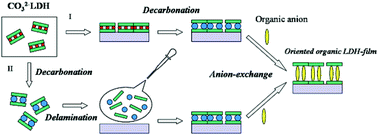Preparation of highly oriented organic–LDH hybrid films by combining the decarbonation, anion-exchange, and delamination processes†
Abstract
For the preparation of highly-oriented thin films of organic–LDHs (layered double

* Corresponding authors
a
Advanced Materials Laboratory, National Institute for Materials Science (NIMS), 1-1, Namiki, Tsukuba, 305-0044, Japan
E-mail:
iyi.nobuo@nims.go.jp
Fax: +81 29 852 7449
Tel: +81 29 860 4357
For the preparation of highly-oriented thin films of organic–LDHs (layered double

 Please wait while we load your content...
Something went wrong. Try again?
Please wait while we load your content...
Something went wrong. Try again?
K. Okamoto, T. Sasaki, T. Fujita and N. Iyi, J. Mater. Chem., 2006, 16, 1608 DOI: 10.1039/B601346E
To request permission to reproduce material from this article, please go to the Copyright Clearance Center request page.
If you are an author contributing to an RSC publication, you do not need to request permission provided correct acknowledgement is given.
If you are the author of this article, you do not need to request permission to reproduce figures and diagrams provided correct acknowledgement is given. If you want to reproduce the whole article in a third-party publication (excluding your thesis/dissertation for which permission is not required) please go to the Copyright Clearance Center request page.
Read more about how to correctly acknowledge RSC content.
 Fetching data from CrossRef.
Fetching data from CrossRef.
This may take some time to load.
Loading related content
